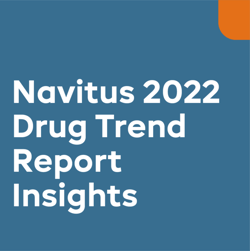Navitus is tracking the latest information on potential COVID-19 treatments.
Identifying clinically effective treatments for COVID-19 is one of the most urgent scientific problems of the moment. Currently there are more than 75 different treatment trials worldwide of both new drugs and older medications.1 Many of these trials have been small, lack control groups and have conflicting results. To make the situation more confusing, a great deal of information – and misinformation – about potential treatments is circulating in the press and social media.

At Navitus, our clinical teams have been paying close attention to the data and the potential impact upon the pharmaceutical supply chain. Here is a look at some of the more commonly discussed treatment options and trial data.
Existing arthritis medications
Hydroxychloroquine/Chloroquine
The interest in hydroxychloroquine has been tremendous. While many states boards of medicine and pharmacy have condemned inappropriate large volume prescribing of hydroxychloroquine, chloroquine, and azithromycin for COVID-19, the FDA has issued an Emergency Use Authorization for these drugs in the treatment of the virus, known as the SARS-COV-2. 2
The preliminary clinical results on hydroxychloroquine are mixed.
A small study at a single institution in China showed negative results in the treatment of COVID-19 with hydroxychloroquine. A slightly more robust trial in the United States showed positive results with reduced time to clinical recovery of body temperature and improvements in cough symptoms and CT scans.
Although these results are far short of conclusive data, expect a continued surge in off-label prescribing, as well as inclusion in treatment and study protocols.
Due to its lower potency against SARS-CoV-2 and greater safety risks, chloroquine is a less-preferred option but is still being studied in the United States and globally. No efficacy results have been reported.
Navitus has implemented quantity limits for new starts to combat potential large volume prescribing and hoarding, while still allowing access for members using for autoimmune conditions or with protocol-driven COVID-19 treatment regimens.
Kevzara (sarilumab) & Actemra (tocilizumab)
Kevzara (sarilumab) & Actemra (tocilizumab) are IL-6 inhibitors, a class of therapeutics used in the treatment of inflammatory diseases. These two drugs are thought to dampen the inflammatory response in the lungs for critically ill COVID-19 patients. Multiple international phase III trials are ongoing. Use of these products will likely be limited to inpatient clinical trials, with medications provided by the pharmaceutical manufacturers. Navitus will continue to monitor use of this treatment regimen in the event it affects availability of these medications for our members.
Jakafi (ruxolitinib)
Jakafi is a commercially available JAK1 & 2 inhibitor marketed in the U.S. for the treatment of myelofibrosis, polycythemia vera, or refractory graft-versus-host disease. There is a late-stage clinical trial for this product for the potential mitigation of “cytokine storms”, an immunologic response noted in the most severe instances of COVID-19. Clinical trials are set to begin enrolling patients in the United States.
Navitus currently manages access to this medication by prior authorization. Any potential use in COVID-19 would likely be in the inpatient setting. Therefore, it would be important to evaluate if this drug would be considered experimental or allowed as part of a member’s medical coverage.
existing anti-microbial and anti-viral medications
Azithromycin
In France, positive case studies have been reported with a protocol of azithromycin and hydroxychloroquine.3 However, these medications together pose a risk for a severe drug-drug interaction causing QT interval prolongation, which would lead to potentially fatal ventricular arrhythmia. Due to this risk, the American College of Cardiology recommends this combination be used in a clinical trial settings only, for a duration of less than 10 days, with adequate monitoring and where the potential benefit outweighs the risk.
Large increases of azithromycin orders have been reported, but prescriptions are down, likely because of reduced non-COVID-19 related medical visits.
Favipiravir
Favipiravir is an influenza treatment available in Japan and China as Avigan. It was previously rejected by the Food and Drug Administration (FDA) for safety concerns.
In small, non-randomized trials, the benefits of favipiravir appear to be more evident in moderately ill COVID-19 patients. The Trump Administration is pressuring the FDA to approve emergency use based on mixed results in China. Anticipate clinical trials for potential COVID-19 treatment to be conducted in the United States soon.
NEW TREATMENTS
Plasma TransfusionsIt’s an old idea that’s been proven with other contagious diseases: give patients who are sick the antibodies contained in blood plasma of those who have recovered.
Plasma transfusions from recovered COVID-19 patients are being studied for treatment in critically ill patients. The Journal of the American Medical Association (JAMA) reports a small five patient case study in China where all patients required mechanical ventilation. After treatment, all patients remained alive. In the United States, treatments began in early April with patients in New York and Houston with plans to administer it to patients across the country.4
Remdesivir is one of the most discussed potential new treatment options for COVID-19. It was originally developed as an antiviral treatment for Ebola and Marburg viruses, but was not shown to be effective. There is some evidence that it may benefit COVID-19 patients. Six large studies are underway in the United States, China and United Kingdom. Work is taking place with researchers and governments around the world to get more clinical trials up and running. Remdesivir has not yet been licensed or approved anywhere globally.
When it comes to infectious diseases, data from the Biotechnology Innovation Organization puts the success rate of new medicines in the early stages of clinical testing at one in five. That means that many of these treatments are likely to fail.5 Nevertheless, with the worldwide effort focused on developing a treatment, the timeline towards a solution is likely to be rapidly accelerated.
We at Navitus will continue to monitor the latest research, drug availability, and industry trends and keep you informed as more information becomes available.
- The Milken Institute COVID-19 Treatment and Vaccine Tracker, https://milkeninstitute.org/covid-19-tracker. Accessed April 8, 2020.
- The US Food and Drug Administration (FDA) Emergency Use Authorizations, https://www.fda.gov/medical-devices/emergency-situations-medical-devices/emergency-use-authorizations. Published February 4, 2020. Accessed April 8, 2020.
- Hydroxychloroquine and azithromycin as a treatment of COVID-19:results of an open-label non-randomized clinical trial. International Journal of Antimicrobial Agents. https://www.sciencedirect.com/science/article/pii/S0924857920300996. Published March 20, 2020. Accessed April 8, 2020.
- Journal of the American Medical Association, JAMA Network. https://jamanetwork.com/journals/jama/pages/coronavirus-alert. Accessed April 8, 2020.
- Clinical Development Success Rates 2006-2015. Biotechnology Innovation Organization. https://www.bio.org/sites/default/files/legacy/bioorg/docs/Clinical%20Development%20Success%20Rates%202006-2015%20-%20BIO,%20Biomedtracker,%20Amplion%202016.pdf. Published June 2016. Accessed April 8, 2020.




